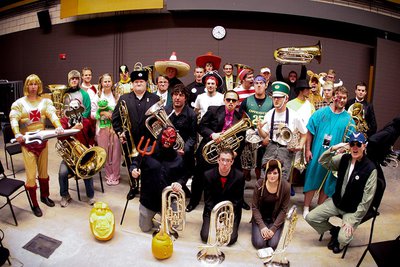
What’s all that orange and black we’re seeing everywhere these days? Could it be … Beavers? No, it signals something even scarier: tubas! The brass wind instruments and other annual Halloween happenings are now invading Eugene music stages.
On Sunday, Oct. 26, Eugene has two family-friendly shows in a row beginning with Central Presbyterian Church’s 4 pm Pipe Screams concert by costumed organists playing spooky music like Bach’s famous toccata and fugue featured in Fantasia. Then at 6:30 pm, the UO’s fourth annual free SpookTastic! concert at Aasen-Hull Hall turns trombones, tubas and euphonia loose on unsuspecting kids and parents, all of whom (including musicians) will be costumed.
On Friday, Oct. 31, Eugene’s unique cello-guitar-accordion-percussion-horn ensemble, Mood Area 52, again presents its original score to the vampire classic Nosferatu at Bijou Art Cinemas (492 E. 13th Ave.).
This year, there’s a new ghoul on the Halloween chopping block: the early music vocal ensemble Vox Resonat’s Day of the Dead concert on Sunday afternoon, Nov. 2, at just about the coolest imaginable venue — Hope Abbey Mausoleum in the Eugene Masonic Cemetery. Brave audiences can hear musical laments on the death of famous decomposing composers, burial music from royal courts and motets of mourning from the 15th and 16th centuries by composers like Ockhegem and Josquin.
There’s more, less scary but equally beautiful, early music onstage this Sunday, Oct. 26, at Central Lutheran, when Ensemble Primo Seicento plays violin, cornetto, trombone, voices and organ tunes by the pioneering early Italian Baroque composers Riccio, Castello and more. There’s more modern music at Chamber Music Amici’s Oct. 27 show at Springfield’s Wildish Theater featuring one of the great Romantic piano trios by Brahms, a sparkling Classical trio by Haydn and — to its great credit — a contemporary piece by Oregon composer David Bernstein.
Besides spooks, the UO music scene includes a rare world music treat: Friday, Oct. 24, Beall Hall hosts Chile’s Phusiri Marka Ensemble, which plays panpipe, tarka and orquesta music by the Aymara people of the Andes. On Oct. 25, Beall features a celebration of music for harp, including a new work by Kimberly Houser. And Sunday features still more new Oregon music — Pius Cheung’s new taiko-inspired “Nian2.” The Oct. 28 Oregon Wind Ensemble concert at Beall includes music by the great American composer Charles Ives, contemporary composer Donald Grantham, Debussy and Percy Grainger.
Another Eugene music ritual recurs this Friday, Oct. 24, when great Scottish fiddler Alasdair Fraser and cellist Natalie Haas bring their traditional sounds and charismatic musical chemistry back to The Shedd, toting a passel of tunes from their new album Abundance. That same night at The Jazz Station, jazz fans might check out tunes from the new album by L.A.’s New West Guitar Group, including groovy covers of everyone from Simon and Garfunkel to The Police. Next Saturday, Nov. 1, the Station hosts one of Eugene’s great musicians, sax master Joe Manis and his Trio featuring New Yorker-turned-Portland organ great George Colligan and drummer Jason Palmer. On Nov. 5, another tasty jazz project, The Spin Quartet, by the excellent Chicago-based trumpeter Chad McCullough, will perform at the Station.
Finally, we note the announcement of Oregon Bach Festival general director John Evans’s decision to leave the festival after more than seven years to return to his British home. When he arrived, Evans announced an ambitious agenda for a festival that really needed an overhaul and, according to the OBF announcement, “brought growth, financial stability and unprecedented participation from guest artists.” He also expanded the festival’s reach beyond Eugene to Portland and the Oregon Coast, forging a strong partnership with Portland Baroque Orchestra that helped the festival overcome its reputation as one of the last old-fashioned holdouts against historically informed Baroque performance practice and period instruments. Evans successfully managed the transition from founding music director Helmuth Rilling to his dynamic young successor Matthew Halls. Until Evans’s successor is chosen, OBF is in good hands under longtime staffer, clarinetist and former Eugene Symphony executive director Michael Anderson.